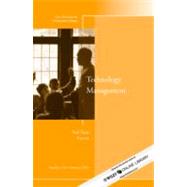
Note: Supplemental materials are not guaranteed with Rental or Used book purchases.
Purchase Benefits
What is included with this book?
1. 4Bs or Not 4Bs: Bricks, Bytes, Brains, and Bandwidth (Tod Treat)
The effective integration of planning to include bricks, bytes, brains, and bandwidth (4Bs) represents an opportunity for community colleges to extend their capacity as a knowledge-intensive organization, coupling knowledge, technology, and learning.
2. Leveraging Web Technologies in Student Support Self-Services (M. Craig Herndon)
The use of web technologies to connect with and disperse information to prospective and current students can be effective for the student as well as effi cient for colleges.
3. Practical Implications of Implementing a Unit Record System on a Community College Campus (Joe Offermann, Ryan Smith)
This chapter addresses the challenges and opportunities of implementing a unit record system on campus by addressing potential costs, benefi ts, and integration with already existing data and accountability processes.
4. Planning for Instructional Technology in the Classroom (Regina L. Garza Mitchell)
Community colleges are known for keeping abreast of the latest instructional technologies, but the constant and rapid growth of available technology also presents challenges. This chapter reviews the current literature regarding instructional technology usage.
5. Web 2.0 Technologies: Applications for Community Colleges (Susanne K. Bajt)
This chapter will provide an overview of Web 2.0 technologies and considerations of their potential to transform the way education is delivered.
6. Andragogy, Organization, and Implementation Concerns for Gaming as an Instructional Tool in the Community College (Vance S. Martin)
The community college provides an effective testbed of immersive experiences for learning. This setting provides essential foundations such as support for innovation, infrastructure, and intentional adoption of various levels of games.
7. Faculty Leadership and Instructional Technologies: Who Decides? (Bob Barber)
Discussion of leadership functions and practices in the realm of instructional technology in community colleges cannot be limited to the administrative side.
8. Models of Technology Management at the Community College: The Role of the Chief Information Officer (Scott Armstrong, Lauren Simer, Lee Spaniol)
In this chapter, community college CIOs speak to their roles, focusing on the critical issues they face today and the approaches their institutions are taking to ensure pre paration for a rapidly changing technological future.
9. IT Funding's Race with Obsolescence, Innovation, Diffusion, and Planning (Jeff Bartkovich)
In times of diffi cult funding, IT managers must build new foundations, rationale statements, methods of operating, and measures of accountability to maintain their funding base.
10. What is Next? Futuristic Thinking for Community Colleges (Thomas Ramage)
This chapter provides a presidential perspective on these trends to suggest that our students of tomorrow must be educated in very different ways and speculates as to what this means for the way we lead our institutions today.
INDEX.
The New copy of this book will include any supplemental materials advertised. Please check the title of the book to determine if it should include any access cards, study guides, lab manuals, CDs, etc.
The Used, Rental and eBook copies of this book are not guaranteed to include any supplemental materials. Typically, only the book itself is included. This is true even if the title states it includes any access cards, study guides, lab manuals, CDs, etc.